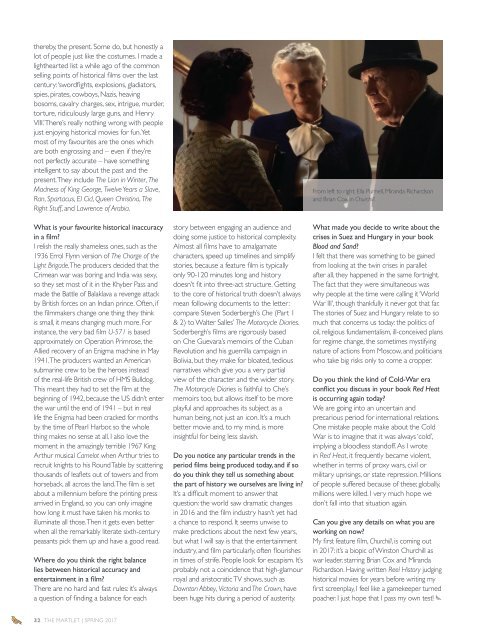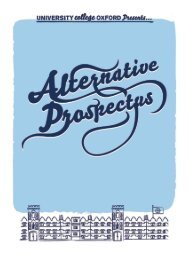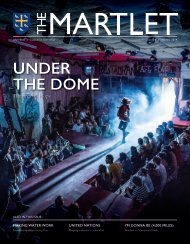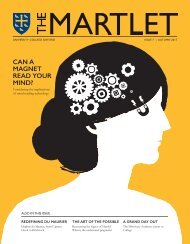Spring Martlet 2017
Spring Martlet 2017 V2
Spring Martlet 2017 V2
- No tags were found...
You also want an ePaper? Increase the reach of your titles
YUMPU automatically turns print PDFs into web optimized ePapers that Google loves.
thereby, the present. Some do, but honestly a<br />
lot of people just like the costumes. I made a<br />
lighthearted list a while ago of the common<br />
selling points of historical films over the last<br />
century: ‘swordfights, explosions, gladiators,<br />
spies, pirates, cowboys, Nazis, heaving<br />
bosoms, cavalry charges, sex, intrigue, murder,<br />
torture, ridiculously large guns, and Henry<br />
VIII.’ There’s really nothing wrong with people<br />
just enjoying historical movies for fun. Yet<br />
most of my favourites are the ones which<br />
are both engrossing and – even if they’re<br />
not perfectly accurate – have something<br />
intelligent to say about the past and the<br />
present. They include The Lion in Winter, The<br />
Madness of King George, Twelve Years a Slave,<br />
Ran, Spartacus, El Cid, Queen Christina, The<br />
Right Stuff, and Lawrence of Arabia.<br />
What is your favourite historical inaccuracy<br />
in a film?<br />
I relish the really shameless ones, such as the<br />
1936 Errol Flynn version of The Charge of the<br />
Light Brigade. The producers decided that the<br />
Crimean war was boring and India was sexy,<br />
so they set most of it in the Khyber Pass and<br />
made the Battle of Balaklava a revenge attack<br />
by British forces on an Indian prince. Often, if<br />
the filmmakers change one thing they think<br />
is small, it means changing much more. For<br />
instance, the very bad film U-571 is based<br />
approximately on Operation Primrose, the<br />
Allied recovery of an Enigma machine in May<br />
1941. The producers wanted an American<br />
submarine crew to be the heroes instead<br />
of the real-life British crew of HMS Bulldog.<br />
This meant they had to set the film at the<br />
beginning of 1942, because the US didn’t enter<br />
the war until the end of 1941 – but in real<br />
life the Enigma had been cracked for months<br />
by the time of Pearl Harbor, so the whole<br />
thing makes no sense at all. I also love the<br />
moment in the amazingly terrible 1967 King<br />
Arthur musical Camelot when Arthur tries to<br />
recruit knights to his Round Table by scattering<br />
thousands of leaflets out of towers and from<br />
horseback, all across the land. The film is set<br />
about a millennium before the printing press<br />
arrived in England, so you can only imagine<br />
how long it must have taken his monks to<br />
illuminate all those. Then it gets even better<br />
when all the remarkably literate sixth-century<br />
peasants pick them up and have a good read.<br />
Where do you think the right balance<br />
lies between historical accuracy and<br />
entertainment in a film?<br />
There are no hard and fast rules: it’s always<br />
a question of finding a balance for each<br />
story between engaging an audience and<br />
doing some justice to historical complexity.<br />
Almost all films have to amalgamate<br />
characters, speed up timelines and simplify<br />
stories, because a feature film is typically<br />
only 90-120 minutes long and history<br />
doesn’t fit into three-act structure. Getting<br />
to the core of historical truth doesn’t always<br />
mean following documents to the letter:<br />
compare Steven Soderbergh’s Che (Part 1<br />
& 2) to Walter Salles’ The Motorcycle Diaries.<br />
Soderbergh’s films are rigorously based<br />
on Che Guevara’s memoirs of the Cuban<br />
Revolution and his guerrilla campaign in<br />
Bolivia, but they make for bloated, tedious<br />
narratives which give you a very partial<br />
view of the character and the wider story.<br />
The Motorcycle Diaries is faithful to Che’s<br />
memoirs too, but allows itself to be more<br />
playful and approaches its subject as a<br />
human being, not just an icon. It’s a much<br />
better movie and, to my mind, is more<br />
insightful for being less slavish.<br />
Do you notice any particular trends in the<br />
period films being produced today, and if so<br />
do you think they tell us something about<br />
the part of history we ourselves are living in?<br />
It’s a difficult moment to answer that<br />
question: the world saw dramatic changes<br />
in 2016 and the film industry hasn’t yet had<br />
a chance to respond. It seems unwise to<br />
make predictions about the next few years,<br />
but what I will say is that the entertainment<br />
industry, and film particularly, often flourishes<br />
in times of strife. People look for escapism. It’s<br />
probably not a coincidence that high-glamour<br />
royal and aristocratic TV shows, such as<br />
Downton Abbey, Victoria and The Crown, have<br />
been huge hits during a period of austerity.<br />
From left to right: Ella Purnell, Miranda Richardson<br />
and Brian Cox in Churchill.<br />
What made you decide to write about the<br />
crises in Suez and Hungary in your book<br />
Blood and Sand?<br />
I felt that there was something to be gained<br />
from looking at the twin crises in parallel:<br />
after all, they happened in the same fortnight.<br />
The fact that they were simultaneous was<br />
why people at the time were calling it ‘World<br />
War III’, though thankfully it never got that far.<br />
The stories of Suez and Hungary relate to so<br />
much that concerns us today: the politics of<br />
oil, religious fundamentalism, ill-conceived plans<br />
for regime change, the sometimes mystifying<br />
nature of actions from Moscow, and politicians<br />
who take big risks only to come a cropper.<br />
Do you think the kind of Cold-War era<br />
conflict you discuss in your book Red Heat<br />
is occurring again today?<br />
We are going into an uncertain and<br />
precarious period for international relations.<br />
One mistake people make about the Cold<br />
War is to imagine that it was always ‘cold’,<br />
implying a bloodless standoff. As I wrote<br />
in Red Heat, it frequently became violent,<br />
whether in terms of proxy wars, civil or<br />
military uprisings, or state repression. Millions<br />
of people suffered because of these; globally,<br />
millions were killed. I very much hope we<br />
don’t fall into that situation again.<br />
Can you give any details on what you are<br />
working on now?<br />
My first feature film, Churchill, is coming out<br />
in <strong>2017</strong>: it’s a biopic of Winston Churchill as<br />
war leader, starring Brian Cox and Miranda<br />
Richardson. Having written Reel History judging<br />
historical movies for years before writing my<br />
first screenplay, I feel like a gamekeeper turned<br />
poacher. I just hope that I pass my own test!<br />
32 THE MARTLET | SPRING <strong>2017</strong>

















